Caffeine consumption and self-assessed stress, anxiety, and depression in secondary school children
- PMID: 26508718
- PMCID: PMC4668773
- DOI: 10.1177/0269881115612404
Caffeine consumption and self-assessed stress, anxiety, and depression in secondary school children
Abstract
Previous research suggests that effects of caffeine on behaviour are positive unless one is investigating sensitive groups or ingestion of large amounts. Children are a potentially sensitive subgroup, and especially so considering the high levels of caffeine currently found in energy drinks. The present study used data from the Cornish Academies Project to investigate associations between caffeine (both its total consumption, and that derived separately from energy drinks, cola, tea, and coffee) and single-item measures of stress, anxiety, and depression, in a large cohort of secondary school children from the South West of England. After adjusting for additional dietary, demographic, and lifestyle covariates, positive associations between total weekly caffeine intake and anxiety and depression remained significant, and the effects differed between males and females. Initially, effects were also observed in relation to caffeine consumed specifically from coffee. However, coffee was found to be the major contributor to high overall caffeine intake, providing explanation as to why effects relating to this source were also apparent. Findings from the current study increase our knowledge regarding associations between caffeine intake and stress, anxiety, and depression in secondary school children, though the cross-sectional nature of the research made it impossible to infer causality.
Keywords: Adolescent behaviour; anxiety; caffeine; depression; energy drinks; sex differences; stress.
© The Author(s) 2015.
Conflict of interest statement
Figures
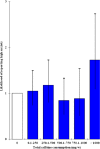
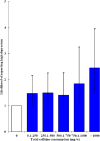
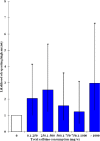
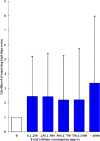
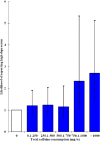
Similar articles
-
School pupils and university students surveyed for drinking beverages containing caffeine.Rocz Panstw Zakl Hig. 2014;65(2):113-7. Rocz Panstw Zakl Hig. 2014. PMID: 25272577
-
Energy drinks, caffeine, junk food, breakfast, depression and academic attainment of secondary school students.J Psychopharmacol. 2018 Aug;32(8):893-899. doi: 10.1177/0269881118783314. Epub 2018 Jun 27. J Psychopharmacol. 2018. PMID: 29947575
-
Caffeine intake from carbonated beverages among primary school-age children.Dev Period Med. 2016 Apr-Jun;20(2):150-6. Dev Period Med. 2016. PMID: 27442701
-
[Caffeine--common ingredient in a diet and its influence on human health].Rocz Panstw Zakl Hig. 2012;63(2):141-7. Rocz Panstw Zakl Hig. 2012. PMID: 22928360 Review. Polish.
-
[Risks of energy drinks in youths].Arch Pediatr. 2010 Nov;17(11):1625-31. doi: 10.1016/j.arcped.2010.08.001. Arch Pediatr. 2010. PMID: 20926266 Review. French.
Cited by
-
Development of a Rapid Method for the Determination of Caffeine in Coffee Grains by GC-FID-A Fully Validated Approach.Antioxidants (Basel). 2017 Aug 22;6(3):67. doi: 10.3390/antiox6030067. Antioxidants (Basel). 2017. PMID: 28829349 Free PMC article.
-
No significant difference in salivary cortisol response on the Trier Social Stress Test-Online based on coffee consumption habits.BMC Psychol. 2024 Sep 13;12(1):483. doi: 10.1186/s40359-024-01968-3. BMC Psychol. 2024. PMID: 39272158 Free PMC article.
-
Green Tea, Coffee, and Caffeine Consumption Are Inversely Associated with Self-Report Lifetime Depression in the Korean Population.Nutrients. 2018 Sep 1;10(9):1201. doi: 10.3390/nu10091201. Nutrients. 2018. PMID: 30200434 Free PMC article.
-
Association of frequent intake of fast foods, energy drinks, or convenience food with atopic dermatitis in adolescents.Eur J Nutr. 2020 Oct;59(7):3171-3182. doi: 10.1007/s00394-019-02157-4. Epub 2019 Dec 10. Eur J Nutr. 2020. PMID: 31822988
-
Habitual coffee drinkers display a distinct pattern of brain functional connectivity.Mol Psychiatry. 2021 Nov;26(11):6589-6598. doi: 10.1038/s41380-021-01075-4. Epub 2021 Apr 20. Mol Psychiatry. 2021. PMID: 33875801 Free PMC article.
References
-
- Adan A, Prat G, Fabbri M, et al. (2008) Early effects of caffeinated and decaffeinated coffee on subjective state and gender differences. Prog Neuropsychopharmacol Biol Psychiatry 32: 1698–1703. - PubMed
-
- Barone JJ, Roberts HR. (1996) Caffeine consumption. Food Chem Toxicol 34: 119–129. - PubMed
-
- Birmaher B, Ryan N, Williamson D, et al. (1996) Childhood and adolescent depression: A review of the past 10 years. Part II. J Am Acad Child Adolesc Psychiatry 35: 1575–1583. - PubMed
Publication types
MeSH terms
Substances
LinkOut - more resources
Full Text Sources
Other Literature Sources
Medical

